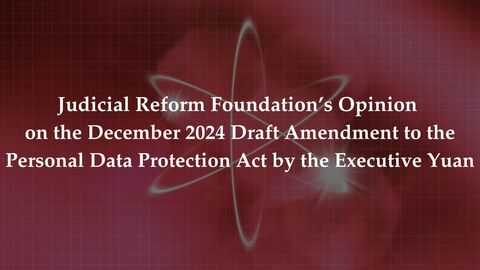最後編輯日:2023年10月17日
在這個數位化快速發展的時代,台灣不僅站在科技創新的前沿,更面對著法律和道德的交織挑戰。
自從2020年,司改會一同參與數位身分證的訴訟開始,我們就持續關注與要求政府應該以最小侵害的方式,負責地蒐集、處理和利用人民的個人資料及數位足跡。這一關注不僅推動了我們參與健保資料庫的憲法訴訟,也讓我們深入參加《科技偵查法》和《通訊保障及監察法》的修訂過程。
於2022年,政府嘗試參考歐盟的法規,提出了《數位中介服務法》的草案。在這個關鍵時刻,我們也積極參與了討論,並開始深入思考如何在保障言論自由與維護數位平台秩序之間找到一個平衡點。
目前,我們也高度關注生成式語言模型帶來的技術變革,這些模型在可預見的未來,將對我們的司法系統產生深遠影響。然而,這些先進模型也可能帶來一系列複雜問題,如訓練資料的來源不明、不足和因此可能出現的認知偏誤及不平等。
總結而言,台灣正站在法規變革的十字路口,民間司法改革基金會(Judicial Reform Foundation)認為,現在正是在更高層次上討論數位基本權利和義務的最佳時刻。因此,我們現正積極推進數位基本法的架構和內容的討論,以全面應對未來的數位挑戰。
無論您是法律專家、科技專才,或是一個關心社會發展的公民,我們都誠摯地邀請您加入這場至關重要的社會對話。
In this rapidly evolving digital age, Taiwan not only stands at the forefront of technological innovation but also faces intricate challenges at the intersection of law and ethics.
Since 2020, when we launched the litigation concerning digital ID cards, we have been continuously monitoring and urging the government to collect, process, and utilize the personal data and digital footprints of the public in a manner that minimizes intrusion. This focus has not only led us to participate in the constitutional litigation regarding the National Health Insurance Research Database (NHIRD) but also deeply engaged in the revision processes of the "Technology Investigation Act" and the "Communication Security and Surveillance Act".
In 2022, the government attempted to draw from the regulations of the European Union, proposing a draft of the "Digital Intermediary Services Act." During this pivotal moment, we actively joined the discussion and began to contemplate how to strike a balance between safeguarding freedom of speech and maintaining order on digital platforms.
Currently, we are also highly concerned about the technological changes brought about by generative language models. These models are expected to have far-reaching impacts on our judicial system in the foreseeable future. However, these advanced models could also introduce a series of complex issues, such as the lack of transparency in training data sources, insufficiency of data, and the potential for cognitive biases and inequality to arise as a result.
In summary, Taiwan is at a crossroads of regulatory transformation, and we believe that now is the optimal time to discuss digital fundamental rights and responsibilities at a higher level. Therefore, we are actively promoting discussions on the framework and content of a Digital Basic Law to comprehensively address future digital challenges.
Whether you are a legal expert, a tech specialist, or a citizen concerned about societal development, we sincerely invite you to join this crucial societal dialogue.










法律意見|民間版《個人資料保護法》修正案
2025-05-27